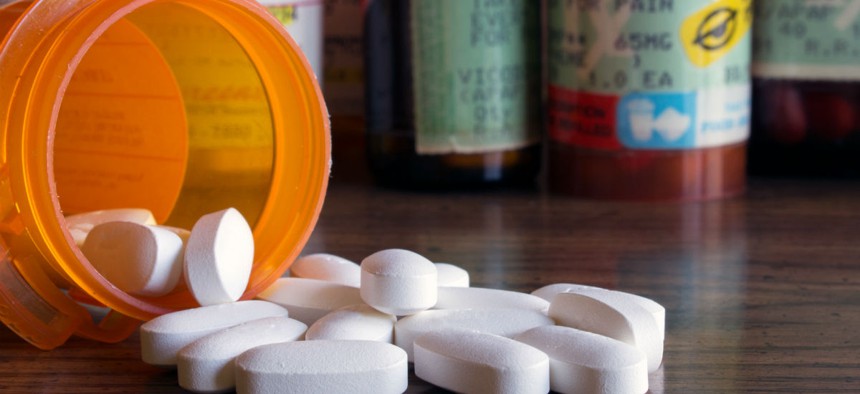
By Kimberly Boyles / Shutterstock.com
DHS Needs to Hire More Officers to Stop the Flow of Opioids, Report Finds
Port officers are screening just 0.008 percent of packages for illicit drugs.
The Homeland Security Department needs thousands of additional port officers, according to its own internal analysis, which Democrats on a congressional oversight committee say could help stymie the flow of illicit opioids into the country.
The need for more staffing at ports of entry runs in contrast to President Trump’s DHS hiring priorities, the Democratic staff on the Senate Homeland Security and Governmental Affairs Committee said in a report released Thursday, which has not included boosts for port officer staffing. Trump’s fiscal 2019 budget instead called for 3,000 new Border Patrol and Immigration and Customs Enforcement agents. Despite Trump’s repeated claims to the contrary, committee Democrats also said a physical barrier or wall along the U.S.-Mexico border would have no impact on the flow of opioids, as they are almost exclusively coming through ports of entry or the mail.
Customs and Border Protection is 4,000 officers short of what its own workforce analysis suggests it requires, the agency told committee members in a private briefing earlier this month. As the influx of illicit opioids continues to grow—individual seizures of fentanyl, for example, increased 345 percent from fiscal years 2016 to 2017—the report found that the increase in CBP officers could play a critical role in reducing the amount of drugs entering the country. The vast majority—88 percent between fiscal years 2013 and 2017—of opioids were seized by CBP’s Office of Field Operations rather than by the Border Patrol.
“Port officers are, in the majority of cases, the last line of defense in preventing illicit opioids from entering the United States,” the Democrats said in their report. “To help stem the opioid crisis, increasing resources and staffing at ports of entry is critical.”
The majority of opioid seizures occurred at ports in San Diego and Tucson, Ariz., according to the report, but staffing failed to keep up at a commensurate rate. CBP was therefore forced to implement “operation overflow,” which for the last two years has temporarily sent hundreds of officers to those ports each quarter. That has robbed resources from other critical CBP functions, the Democrats said. Across the country, port and customs officers are overseeing potential trade agreement violations, interviewing entrants into the country, collecting customs fees and inspecting goods, and are ill-prepared for the current massive influx of opioids.
CBP officers are also stationed at U.S. Postal Service international mail centers and private, international shipping facilities, such as those operated by UPS, FedEx and DHL. Most seizures actually happen through international mail, though more opioids as measured by weight come through land ports. CBP estimated to the committee investigators that 65 million pieces of international packages come into the country annually via private carriers and there are fewer than 400 port officers to inspect them. The officers inspect just 100 of the 1.3 million inbound international packages that USPS handles every day.
The inspections are a laborious process, requiring special hazmat equipment and canine teams. Trace amounts of fentanyl can potentially cause overdoses, CBP officials have told Government Executive. The agency is increasingly training its officers to administer naloxone, a drug that can help individuals recover from opioid overdoses.
Federal agencies such as CBP, USPS and the State Department have long struggled to ensure all incoming international mail is accompanied by advanced data that help officers identify which packages to inspect. Private carriers are required to provide such data, but mail sent through the Postal Service often does not include it. Less than 40 percent of packages sent in 2017 through USPS contained the data, the committee found. CBP issued $26 million in fines to private carriers for failing to provide the advanced information, but those were ultimately negotiated down to just $4 million.
Sen. Rob Portman, R-Ohio, introduced last year the Synthetics Trafficking and Overdose Prevention Act (S. 372) to require the advanced data for all USPS packages. The measure has 32 bipartisan cosponsors, but has yet to receive a vote. Some stakeholders have expressed concern that certain countries are incapable of providing the information and the measure would therefore result in residents of those nations no longer being able to send packages to the United States. Trump’s opioid commission has endorsed the bill.
Committee Democrats pointed to another bill to address the situation, one from the panel's ranking member, Sen. Claire McCaskill, D-Mo. The Border and Port Security Act (S. 2314) would require CBP to add 500 officers annually until it met the figures laid out in its staffing model. The House has already authorized CBP to hire 5,000 new officers—in addition to 5,000 border agents—as part of the 2017 Border Security for America Act. CBP currently has more than 1,300 authorized positions it has not yet filled. Even if it met that level, the agency would have to hire another 2,700 officers to reach its projected needs.
Tony Reardon, president of the National Treasury Employees Union, which represents 25,000 CBP officers and has long highlighted understaffing at the agency, praised the report.
“This groundbreaking report from Sen. McCaskill doesn’t just identify the problem, she also has a solution,” Reardon said. “Adequately staffing our ports of entry with law enforcement personnel professionally trained to interdict illegal drug shipments is the fastest way to stem the deadly opioid tide into our communities.”







